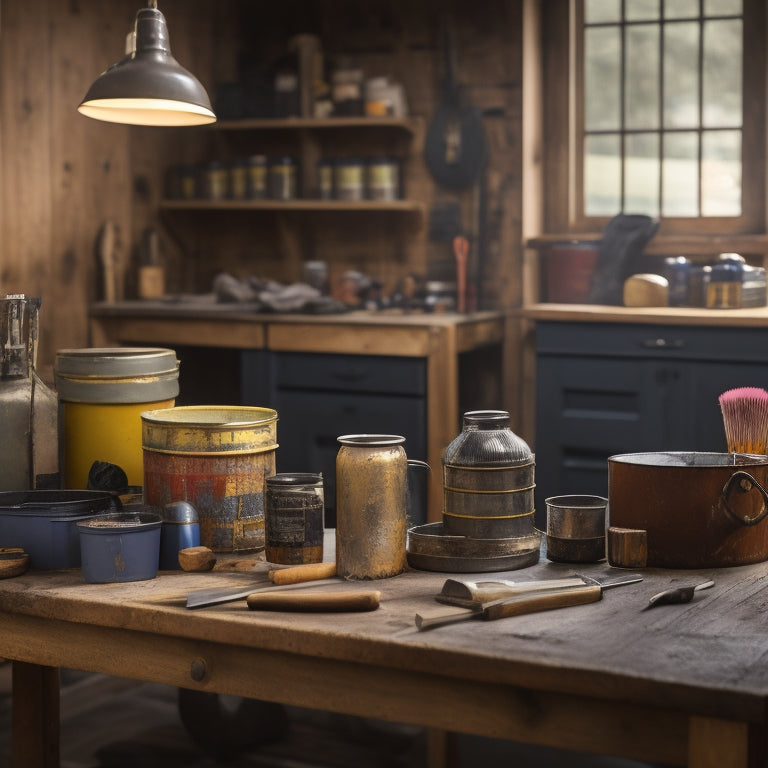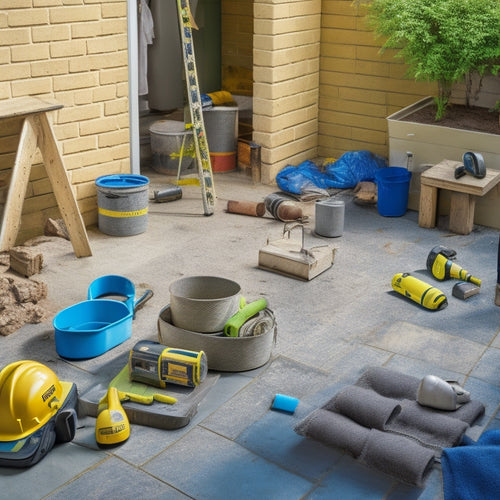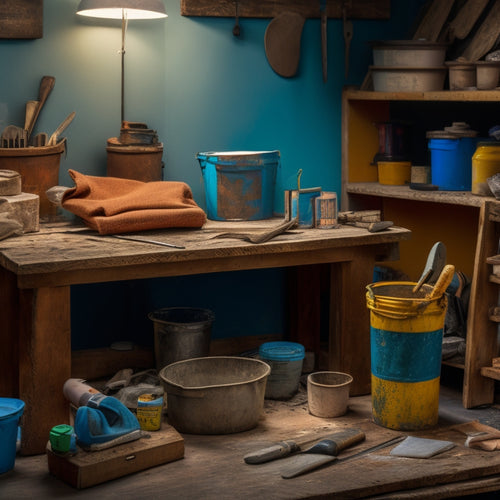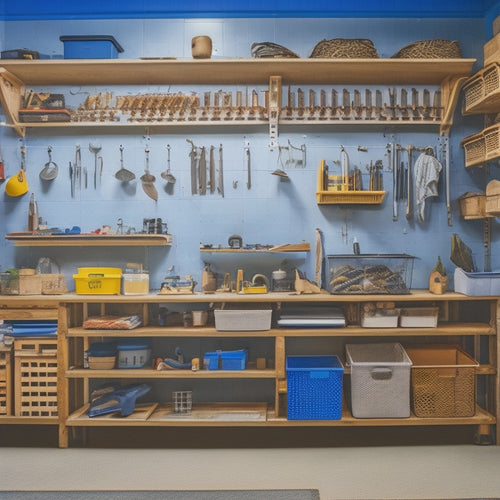
Best Polyurethane Deals for Home Renovation Projects
Share
When searching for the best polyurethane deals for your home renovation project, you'll want to compare prices among top brands like Minwax, Varathane, and Zinsser, which range from $10 to $30 per quart. Understanding the factors that influence cost, such as type, brand reputation, and specific features, will help you make informed decisions. Additionally, capitalizing on bulk purchasing strategies and seasonal sales can lead to significant savings. By doing your research and considering your project's specific needs, you'll be able to find the perfect polyurethane for your budget. Now, explore the nuances of polyurethane pricing and discover even more ways to optimize your project's costs.
Key Takeaways
• Research and compare prices of different polyurethane types, brands, and retailers to find the best deals for your home renovation project.
• Consider bulk purchasing polyurethane adhesives to lower the cost per unit, ideal for large-scale projects.
• Look for eco-friendly water-based polyurethane options, which are generally more affordable than oil-based alternatives.
• Utilize cost calculators and factor in surface preparation, application techniques, and complexity of application to estimate project costs accurately.
• Opt for budget-friendly polyurethane options from reputable brands like Minwax, Varathane, and Zinsser, which offer quality at affordable prices.
Top Polyurethane Brands Compared
When it comes to choosing the right polyurethane for your home renovation project, you're likely to encounter a multitude of brands vying for your attention, each touting its unique benefits and features. As you navigate this overwhelming landscape, it's crucial to understand the different polyurethane types and their application techniques.
Oil-based polyurethanes, for instance, provide a rich, warm glow but have strong fumes and take longer to dry. Water-based polyurethanes, on the other hand, are more environmentally friendly, dry faster, and have fewer fumes. There are also hybrid polyurethanes that combine the benefits of both.
Top brands like Minwax, Varathane, and Zinsser offer a range of polyurethane types, each with its unique strengths. Minwax, for example, is known for its high-gloss finish, while Varathane is popular for its fast-drying formula. Zinsser, on the other hand, is renowned for its high-performance, low-VOC options.
Best Deal on Polyurethane Crack Filler
As you prepare to apply your chosen polyurethane, you'll need to assure your surface is smooth and even, which is where a high-quality crack filler comes in - and finding the best deal on one can make all the difference in your project's success.
A crack filler is an essential component in polyurethane applications, as it assures a strong bond between the polyurethane and the surface.
Here are three advantages of using a high-quality crack filler:
-
Improved Durability: A crack filler helps to create a strong, durable bond between the polyurethane and the surface, reducing the likelihood of cracks and damage.
-
Enhanced Aesthetics: By filling in cracks and imperfections, a crack filler allows for a smooth, even finish that enhances the overall appearance of your project.
-
Increased Efficiency: Using a crack filler saves you time and effort in the long run, as it eliminates the need for costly repairs and touch-ups down the line.
Polyurethane Foam Insulation Prices
You'll likely be surprised by the varying polyurethane foam insulation prices on the market, which can range from under $1 to over $3 per board foot, depending on the type, brand, and R-value you choose. Understanding the costs associated with different insulation types is essential to making an informed decision for your home renovation project. One of the significant polyurethane benefits is its high R-value, which can save you money on energy bills in the long run.
Here's a breakdown of the prices for different types of polyurethane foam insulation:
| Insulation Type | Price Range (per board foot) |
|---|---|
| Open-cell spray foam | $0.50 - $1.50 |
| Closed-cell spray foam | $1.00 - $2.50 |
| High-density foam board | $1.50 - $3.00 |
| Low-density foam board | $0.75 - $2.00 |
| Foam panels | $1.00 - $2.50 |
When selecting a polyurethane foam insulation, consider factors such as R-value, durability, and brand reputation. While higher-priced options may offer superior performance, they may not be necessary for your project. By weighing your options carefully, you can find the best deal on polyurethane foam insulation that meets your needs and budget.
Cost of Polyurethane Wood Finish
When it comes to calculating the cost of polyurethane wood finish, you'll want to take into account a few key factors that can affect the overall price.
On average, you can expect to pay between $10 and $30 per quart, depending on the type and quality of the product.
As you research and compare prices, keep in mind that the specific features and requirements of your project will ultimately determine the final cost.
Average Price Range
Depending on the brand, quality, and type of polyurethane wood finish you choose, you can expect to pay anywhere from $10 to $50 per quart, with high-gloss finishes typically falling at the higher end of this price spectrum.
When it comes to average price fluctuations, you'll notice that prices can vary considerably depending on the region you're in.
For instance:
-
Urban areas: You can expect to pay a premium for polyurethane wood finishes in urban areas, with prices ranging from $20 to $40 per quart.
-
Suburban areas: Prices tend to be more moderate in suburban areas, falling between $15 to $30 per quart.
-
Rural areas: If you live in a rural area, you may be able to find cheaper options, with prices ranging from $10 to $20 per quart.
Keep in mind that these are general estimates, and prices can fluctuate based on various factors.
Understanding the average price range can help you make an informed decision when it comes to choosing the right polyurethane wood finish for your home renovation project.
Factors Affecting Cost
As you narrow down your polyurethane wood finish options, it's clear that several factors can impact the final cost, including the type of polyurethane, its brand reputation, and the specific features you need for your home renovation project.
The type of polyurethane you choose, for instance, can greatly affect the price. Water-based polyurethanes tend to be more affordable than oil-based ones, which require solvents and often have a stronger finish.
Brand reputation also plays an important role in determining the cost. Established brands with a reputation for quality and durability may charge more than lesser-known brands.
Additionally, the specific features you need for your project can drive up the cost. For example, if you require a polyurethane with UV protection or a specific sheen level, you may need to pay more.
Market trends can also impact the cost, as changes in demand and supply can influence prices. Moreover, material quality is a critical factor, as high-quality polyurethanes with better formulations and ingredients will generally cost more than lower-quality alternatives.
Polyurethane Adhesive Price Analysis
When you're shopping for polyurethane adhesives, you'll want to understand the cost breakdown to make informed decisions.
You'll find that prices vary depending on the type, brand, and quantity you need, and it's crucial to weigh these factors against your project's requirements.
Adhesive Cost Breakdown
You'll likely spend between $5 and $20 per tube for a high-quality polyurethane adhesive, with the overall cost determined by the specific product, brand, and quantity you need for your home renovation project. The cost can add up quickly, especially if you're working on a large project that requires multiple tubes of adhesive.
Here are three key factors that affect the cost of polyurethane adhesive:
-
Adhesive application: The type of application you're using the adhesive for will impact the cost. For example, if you're using it for flooring, you may need a more heavy-duty adhesive that can withstand foot traffic, which will cost more.
-
Adhesive durability: The durability of the adhesive is another factor that affects the cost. If you need an adhesive that can withstand harsh weather conditions or heavy use, you'll likely pay more for a high-quality, long-lasting product.
-
Brand and quantity: The brand and quantity of adhesive you choose will also impact the cost. Buying in bulk from a reputable brand can often save you money in the long run, but may require a larger upfront investment.
Competitive Pricing Options
To get the best value for your money, it's essential to research and compare prices from various manufacturers, retailers, and online marketplaces. Consider factors like product features, brand reputation, and customer reviews. You'll want to explore different pricing options to find the most competitive deals for your polyurethane adhesive needs.
One strategy is to take advantage of bulk purchasing. Buying in bulk can greatly reduce the cost per unit, making it a cost-effective option for large-scale projects. Additionally, keep an eye out for seasonal sales and promotions, which can offer discounts and special offers on polyurethane adhesives. Online marketplaces like Amazon or Home Depot often provide price comparisons and customer reviews, helping you make an informed decision.
When evaluating prices, consider the total cost of ownership, including any additional features or accessories that may be required. Be wary of extremely low prices, as they may indicate a lower-quality product. By doing your due diligence and comparing prices, you can find the best polyurethane adhesive deals for your home renovation project.
Polyurethane Coating Cost Calculator
How much will it cost to apply a polyurethane coating to your floors or furniture - a question that can be accurately answered with a reliable polyurethane coating cost calculator. This handy tool takes into account various factors, including the size of your project, the type of polyurethane you're using, and the complexity of the application process.
By inputting these details, you'll get a precise estimate of the costs involved, helping you plan your budget and make informed decisions.
Here are three key factors that affect the cost of polyurethane coating:
-
Surface preparation: The condition of your floors or furniture affects the amount of prep work required, which in turn impacts the overall cost.
-
Polyurethane application techniques: The method you choose to apply the polyurethane, such as brushing, rolling, or spraying, influences the cost and environmental impact of the project.
-
Environmental impact: Eco-friendly polyurethane options and sustainable application methods can increase the cost, but they also reduce the project's carbon footprint.
Budget-Friendly Polyurethane Options
With a clear understanding of the factors affecting polyurethane coating costs, you can now explore budget-friendly options that meet your needs without breaking the bank. As a homeowner, you don't have to sacrifice quality for affordability. Here are some affordable alternatives to evaluate:
| Product | Price Range |
|---|---|
| Minwax Polyurethane | $10-$20 |
| Varathane Polyurethane | $15-$30 |
| Zinsser Polyurethane | $20-$40 |
| Water-based Polyurethane | $10-$25 |
| DIY Polyurethane Kit | $5-$15 |
These options are perfect for DIY applications, allowing you to take control of your home renovation project. Minwax and Varathane offer high-quality polyurethane coatings at an affordable price. Zinsser is another popular choice, known for its durability and versatility. If you're looking for an eco-friendly option, water-based polyurethane is a great alternative. For the most budget-conscious, a DIY polyurethane kit can be a cost-effective solution. With these options, you can achieve a professional-looking finish without overspending.
Frequently Asked Questions
Can I Mix Polyurethane With Other Finishes for a Custom Color?
When you're looking to create a custom color, you might wonder if you can mix polyurethane with other finishes.
The answer is, it depends. You'll need to verify the finishes are compatible, as some can react negatively when mixed.
Always check the manufacturer's instructions and test a small batch before applying it to your project.
If you're unsure, start with a small amount and gradually add more until you achieve the desired custom color.
How Long Does Polyurethane Take to Fully Cure and Harden?
When you apply polyurethane, you'll want to know how long it takes to fully cure and harden.
The curing process can vary depending on environmental factors, but on average, it takes 24 hours for the initial drying time.
However, it can take up to 30 days for the polyurethane to fully harden and reach its maximum durability.
You'll know it's fully cured when it's rock-hard and resistant to scratches.
Is Polyurethane Safe to Use on Surfaces With High Humidity?
You're about to plunge into a project like a ship steering through treacherous waters, and you're wondering if polyurethane is safe to use on surfaces with high humidity.
The answer is, it depends on the type of polyurethane and surface preparation. Look for humidity-resistant polyurethane formulas, and make certain the surface is clean, dry, and free of moisture.
Proper surface preparation is key to a successful application. With the right prep and polyurethane, you'll be sailing smoothly to a beautiful finish.
Can I Apply Polyurethane Over an Existing Finish or Stain?
When applying polyurethane, you're probably wondering if you can do so over an existing finish. The answer is yes, but with caution.
First, make certain the existing finish is fully cured and dry. Lightly sand the surface to create a strong bond between the old and new finishes.
Then, apply a thin coat of polyurethane, following the manufacturer's instructions. This will guarantee a strong, durable finish that lasts.
Does Polyurethane Come With a Warranty or Guarantee?
You're probably wondering if polyurethane comes with a warranty or guarantee. The answer is, it depends on the type of polyurethane you choose.
Some manufacturers offer a limited warranty, usually ranging from 1-5 years, covering defects and performance issues.
Others may provide a satisfaction guarantee, allowing you to return or exchange the product if it doesn't meet your expectations.
Be sure to check the warranty coverage before making a purchase, so you can have peace of mind with your project.
Conclusion
You've got all the facts, now it's time to seal the deal! With our thorough guide, you're well-equipped to navigate the polyurethane market like a pro.
Remember, when it comes to home renovation, penny-pinching can be a false economy - don't cut corners, or you might end up crying over spilt milk.
Invest in quality polyurethane products that'll stand the test of time, and your wallet will thank you in the long run.
Related Posts
-

7 Patio Safety Tips for DIY Renovation Projects
As you begin your DIY patio renovation project, prioritize safety by evaluating the worksite for tripping hazards and...
-

DIY Plastering Supply Checklist for Home Renovation
To tackle a DIY plastering project for your home renovation, you'll need a solid checklist of supplies. Start with es...
-

7 Best Tool Storage Ideas for Home Renovation
When it comes to home renovation, staying organized is key to maximizing productivity and minimizing wasted time. To ...


